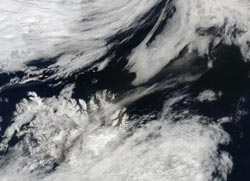NASA's Terra sees ash plume pulled to the northeast by a low

NASA\'s Terra satellite captured the ash plume from Eyjafjallajokull Volcano, Iceland, on May 18 at 12:20 UTC (8:20 a.m. EDT), blowing to the northeast due to a low pressure area. Credit: NASA Goddard / MODIS Rapid Response Team<br>
The brownish ash plume was being pushed to the northeast from a low pressure area situated to Iceland's northeast. The Moderate Resolution Imaging Spectroradiometer or MODIS instrument that flies aboard Terra captured an image on May 18 at 12:20 UTC (8:20 a.m. EDT).
NASA works with other agencies on using satellite observations to aid in the detection and monitoring of aviation hazards caused by volcanic ash. For more on this NASA program, visit: http://science.larc.nasa.gov/asap/research-ash.html.
As weather systems to continue to interact with the ash plume, it will continue to shift, so air travel may always be affected.
Media Contact
All latest news from the category: Earth Sciences
Earth Sciences (also referred to as Geosciences), which deals with basic issues surrounding our planet, plays a vital role in the area of energy and raw materials supply.
Earth Sciences comprises subjects such as geology, geography, geological informatics, paleontology, mineralogy, petrography, crystallography, geophysics, geodesy, glaciology, cartography, photogrammetry, meteorology and seismology, early-warning systems, earthquake research and polar research.
Newest articles

Recovering phosphorus from sewage sludge ash
Chemical and heat treatment of sewage sludge can recover phosphorus in a process that could help address the problem of diminishing supplies of phosphorus ores. Valuable supplies of phosphorus could…

Efficient, sustainable and cost-effective hybrid energy storage system for modern power grids
EU project HyFlow: Over three years of research, the consortium of the EU project HyFlow has successfully developed a highly efficient, sustainable, and cost-effective hybrid energy storage system (HESS) that…

After 25 years, researchers uncover genetic cause of rare neurological disease
Some families call it a trial of faith. Others just call it a curse. The progressive neurological disease known as spinocerebellar ataxia 4 (SCA4) is a rare condition, but its…





















